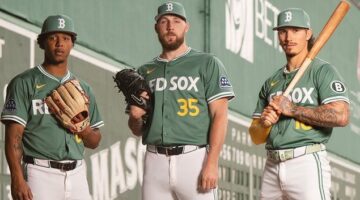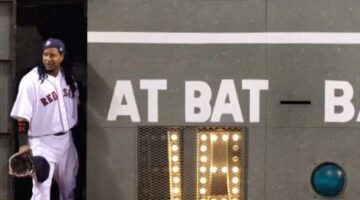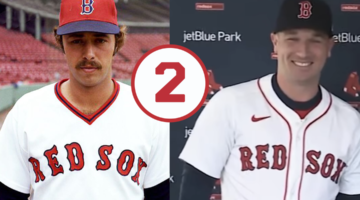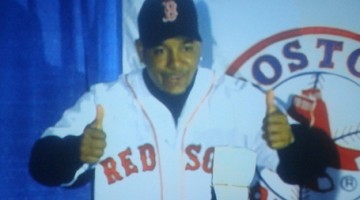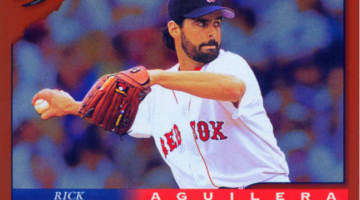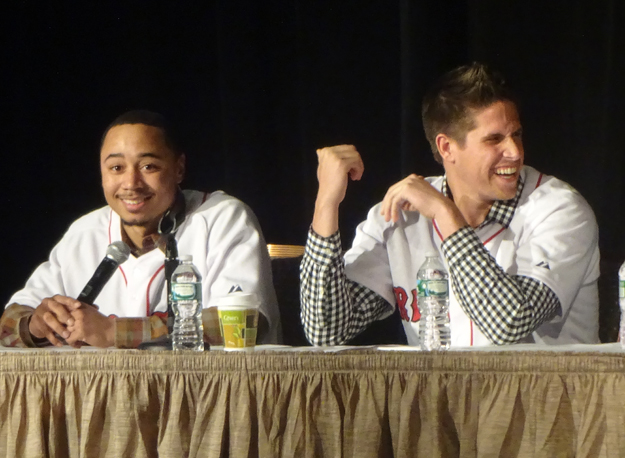
Reminder that Baseball’s a Business,
At one of the first Red Sox Winter Weekends a few years back, I stumbled into a panel discussion with “up and coming” prospects. Mookie Betts was there, along with Garin Cecchini and a handful of others. I had a pretty good glow thanks to the seven liters of gin I managed to smuggle into the building by hiding it in my stomach and bloodstream, but I do rather clearly recall how gobsmacked Mook looked to be sitting behind a desk at a panel at Red Sox Winter Weekend in front of hundreds of fans, talking about what it’s like to be part of the Red Sox organization and play ball for a living. His giddiness was palpable.
I turned to whoever was next to me (I was drunk, so it could have been a person or a wall) and said, “this kid’s gonna be fun to watch.”
And he was. Over the next few years, Mookie morphed from “who’s that?” to “how can we live without him?” Dude can hit, field, steal. Watching him lay out for a seemingly impossible catch in Fenway’s outfield makes you almost forget he came up as a second baseman.
Beyond this versatility, a big part of what makes Mookie so watchable — and so endearing in an Ortiz-like sense — is the absolute joy with which he plays the game. He’s roughly the size of a sixth-grader and plays with the unabashed enthusiasm of one, whether he’s sheepishly watching a replay of himself on the video screen or chugging down the line, gold chain flapping in the breeze. Discovering that he’s also a bowling champion in his home state of Tennessee was icing on the cake.
In last year’s lost year, Mookie was a good thing. Maybe the best thing. And he seemed chief among the players suited to fill Ortiz’s oversized shoes as Ambassador of Red Sox Goodwill.
But now he’s gone, traded to the Los Angeles Dodgers along with David Price.
Losing Price I can handle, but losing Mookie… that hurts. It’s another homegrown talent lost, just like we lost Jon Lester. And if we’re still feeling the impact of Lester 5 years later, I can only imagine how Life After Mookie will play out.
The good news is: we’re all in this together. So here’s a handy guide to surviving the four stages of grief that are sure to come in the post-Mookie world.
1. Anger
The minute the Betts trade was announced, I openly prayed for John Henry and Tom Werner to be attacked by a pack of hairless gibbons. And the fact that you could hear the spin machine whirring in the days before it was announced made it even more painful. “Mookie wanted too much money.” “How can [insert high figure here] not be enough?” “We, as owners, can’t fathom why he wouldn’t take less money to play in front of these adoring fans.” If ownership wants to take the position that Mookie was going to leave anyway and test the free agent waters, well that’s one thing. My question is how do you let it get to that point? With David Ortiz packing it up, you had a player who was set to slide into the vacant position of Red Sox Ambassador to the World. Fans love him, they love watching him play, and — this is the important part — Mookie’s good at his job. Over the last few years alone, I’ve seen ownership throw money at people who were just “okay” (Nathan Eovaldi comes to mind) or outright disasters (Pablo Sandoval). If you’ve got a young MVP who hits the sweet spot between damn good player and fan favorite, why in Shit Hill would you not lock him up? But no matter who you point the finger at in this mishap (“Mookie was leaving anyway!” “Ownership lowballed him!”), shit like this is a solemn reminder that baseball is a business. Professional athletes have a finite window to make as much bank as they can, and we can’t begrudge them that. And owners, who view everything from a loftier height under advisement from their financial people, sometimes make pretty fucked-up decisions. Part of being a fan of a team means accepting that the Lesters and Pedros and Muellers and Millars and Porcellos and Mo Vaughns will one day be gone, whether it’s their choice or the team’s.
2. Denial
When John Lester was sent packing to Oakland in 2014, my booze-soaked brain sought solace in the belief that the Sox would re-sign him when he became a free agent at the end of that year. That’s what’s known as a “cry for help.” Jonny wasn’t coming back, despite my letters and poems and mix tapes and that night I showed up at his mansion with a bouquet of roses that I was gonna tell him was from Red Sox ownership if I hadn’t been beaten within an inch of my life by his security guards. Mookie isn’t coming back, either. Embrace that now and you’ll be better off. Just ask the billy club still lodged in my colon.
3. Dismissal
A coworker told me this morning that he’s “done with the Red Sox.” I tipped my top hat and said, “Well, my good man, if you are done with the Red Sox today, I would dare say you were never fully with them.” And I pranced a bit, then kicked him in the nuts. Because if the loss of a player like Mookie — as shiterrific as it is — has you turning in your laminated Red Sox Nation card, you can just keep runnin’. The Red Sox are that ex who does that thing you like whose texts you’ll never not respond to. Better yet, they’re the symbiotic black costume that attached itself to Spider-Man. Once it’s latched on, it’s never coming off. They can slap us around, trade off our heroes, and stomp on our hearts. But when the dust clears and the bunting is up and down the baselines and Wally is waving his flag and the popcorn and fifty dollar beers are flowin, we’ll be back. We always come back. Because that’s what we do.
4. Acceptance
Right after the Red Sox were unceremoniously swept out of the 1990 ALCS by the Oakland A’s, the Red Sox quietly released Dwight Evans, a veritable local legend, all-around good guy and player who should have been granted Red Sox for Life status. Dewey went on to play one more year for the Baltimore Orioles. For Young Red, the fact that the Red Sox wouldn’t let Dewey finish his career with us, on his terms, was the loss of innocence. The day I realized the owners don’t give shit one about the players or the fans or the beer or the scorecards or the fake wax lips or the fact that Van Halen was actually a better band with Sammy Hagar. They care about profits.
Simply put, if I could survive this:
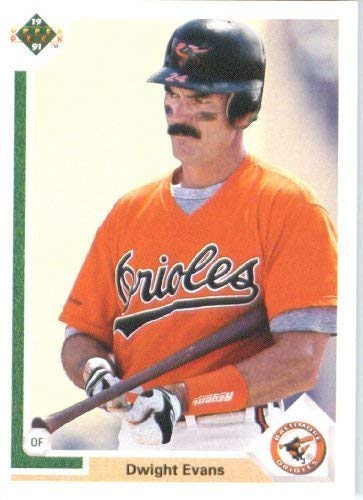
I can survive anything.
Good luck to Mookie, and here’s to whatever the 2020 season brings.

